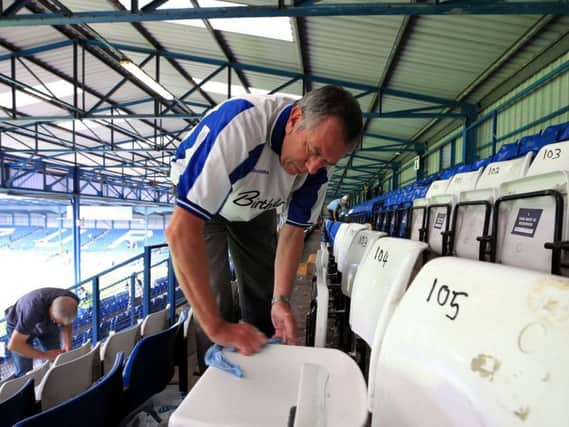Why football authorities should hang their heads in shame at the demise of Bury, while near-neighbours Bolton Wanderers fight for their own footballing life


Amid the seemingly endless cycle of depressing stories in these increasingly uncertain times, there was a reviving 'And finally' item on the news; you could almost envisage the late Sir Alastair Burnet delivering it on News at Ten back in the day with just the trance of a smile.
Bury FC seemingly had a reprieve at the 11th hour and the reaction of those who had congregated at their particular cathedral of Gigg Lane was spontaneous, wonderful and a little gem to behold. As starts to long weekends go, it was uplifting for those who love their sport across the land and who revel in the triumph of the human spirit amid adversity.
Advertisement
Hide AdAdvertisement
Hide AdJust four days on and the kick in the teeth may well have been delivered by a Tyrannosaurus and a proud Lancashire town silently weeps.
The first team to be bounced out of the English Football League since Maidstone in 1992, Bury's plight is a very human one - and a collective stain on our game.
How you felt for the 300-odd volunteers who turned up to 'Gigg' on Tuesday to spruce up the ground with hope in their hearts that the club's homecoming could take place against Doncaster Rovers on Saturday.
How you empathised with poor Kenny, the lifelong Shakers fan whose story did the rounds on social media, speaking about his 70-year support of his club, his life - and his incomprehension and bewilderment that it might be taken away.
Advertisement
Hide AdAdvertisement
Hide AdWhile a community reels from a colossal blow - and another neighbouring town just six miles away in Bolton prays for the continued existence of their own stricken club which is currently on the equivalent of a life support machine - there is the dawning realisation that others could suffer further ignominy down the line if things do not change.
A toxic cocktail of unfit-for-purpose owners who have shown scant duty of care to the proud footballing institutions of Bury and Bolton and the weak regulatory powers of the EFL characterised in their effete 'Owners and Directors' Test means that certain individuals should hang their heads in shame this morning and be asking questions of themselves.
In Bury, there is a grievous sense of emptiness at the death knell for their club after 135 years.
Head west to Bolton and there is an eerie chill and sense of foreboding as scarred supporters, punch-drunk at painful events in another annus horribilis, wonder if their club can avoid the same dreadful fate as their near-neighbours.
Advertisement
Hide AdAdvertisement
Hide AdBack across the Pennines in Yorkshire, followers of the likes of Doncaster Rovers, Rotherham United, Huddersfield Town and Hull City - clubs who have had their own brush with footballing oblivion in days gone by - will recall some painful times of days gone by and collectively say: 'there but for the grace of God, go I.'
For many other concerned supporters have have also watched the bitter Red Rose developments, there will be the grim realisation that the ever-growing financial disparity between levels of the EFL pyramid may soon be threatening the existence of others. Potentially, their club.
The likes of Coventry City, Blackpool, Oldham Athletic and Macclesfield Town have all suffered well-documented privations in recent years and plenty of others besides.
Only last week, a report worryingly revealed that the EFL was directly warned by experts two years ago that clubs were risking financial turmoil.
Advertisement
Hide AdAdvertisement
Hide AdSufficiently alarmed following their research in 2017, financial data firm Vysyble reportedly arranged a meeting with the EFL at which they suggested changes in how they assessed the financial status of clubs and warned of an increased risk of administrations and winding-up petitions.
It was advice that was essentially ignored according to John Purcell, the co-founder of Vysyble, with the formal league response going onto claim that the competition was in a "strong financial position".
How that phrase must send a shiver down the spine of followers of several clubs who continue to try and somehow eke out a living away from the Premier League gravy train.